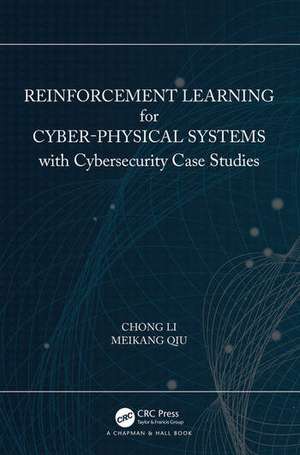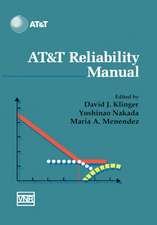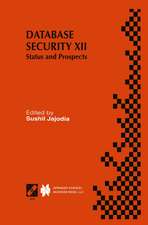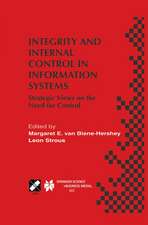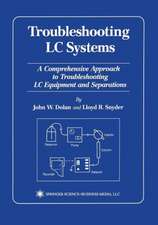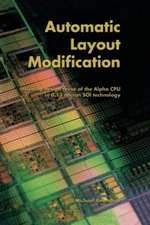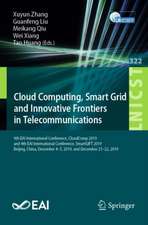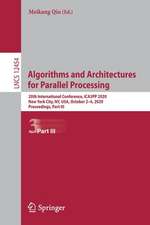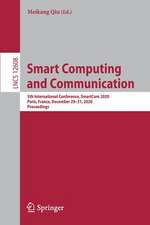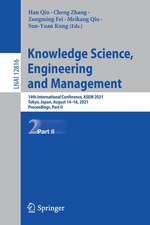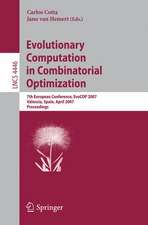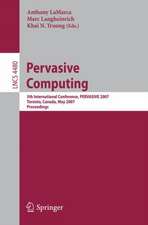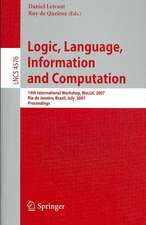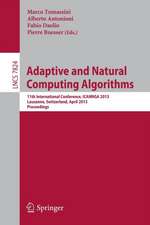Reinforcement Learning for Cyber-Physical Systems: with Cybersecurity Case Studies
Autor Chong Li, Meikang Qiuen Limba Engleză Hardback – 4 feb 2019
However, the conventional hand-programming controller in CPSs could neither handle the increasing complexity of the system, nor automatically adapt itself to new situations that it has never encountered before. The problem of how to apply the existing deep RL algorithms, or develop new RL algorithms to enable the real-time adaptive CPSs, remains open. This book aims to establish a linkage between the two domains by systematically introducing RL foundations and algorithms, each supported by one or a few state-of-the-art CPS examples to help readers understand the intuition and usefulness of RL techniques.
Features
- Introduces reinforcement learning, including advanced topics in RL
- Applies reinforcement learning to cyber-physical systems and cybersecurity
- Contains state-of-the-art examples and exercises in each chapter
- Provides two cybersecurity case studies
Preț: 675.09 lei
Preț vechi: 843.85 lei
-20% Nou
Puncte Express: 1013
Preț estimativ în valută:
129.19€ • 140.29$ • 108.52£
129.19€ • 140.29$ • 108.52£
Carte tipărită la comandă
Livrare economică 23 aprilie-07 mai
Preluare comenzi: 021 569.72.76
Specificații
ISBN-13: 9781138543539
ISBN-10: 1138543535
Pagini: 256
Ilustrații: 4 Tables, black and white; 64 Illustrations, black and white
Dimensiuni: 156 x 234 x 16 mm
Greutate: 1.23 kg
Ediția:1
Editura: CRC Press
Colecția Chapman and Hall/CRC
ISBN-10: 1138543535
Pagini: 256
Ilustrații: 4 Tables, black and white; 64 Illustrations, black and white
Dimensiuni: 156 x 234 x 16 mm
Greutate: 1.23 kg
Ediția:1
Editura: CRC Press
Colecția Chapman and Hall/CRC
Public țintă
Professional Practice & DevelopmentCuprins
Section I Introduction
Chapter 1 □ Overview of Reinforcement Learning
Chapter 2 □ Overview of CyberPhysical Systems and Cybersecurity
Section II Reinforcement Learning for Cyber-Physical Systems
Chapter 3 □ Reinforcement Learning Problems
Chapter 4 □ Modelbased Reinforcement Learning
Chapter 5 □ Modelfree Reinforcement Learning
Chapter 6 □ Deep Reinforcement Learning
Section III Case Studies
Chapter 7 □ Reinforcement Learning for Cybersecurity
Chapter 8 □ Case Study: Online CyberAttack Detection in Smart Grid
Chapter 9 □ Case Study: Defeat Maninthemiddle Attack
Chapter 1 □ Overview of Reinforcement Learning
Chapter 2 □ Overview of CyberPhysical Systems and Cybersecurity
Section II Reinforcement Learning for Cyber-Physical Systems
Chapter 3 □ Reinforcement Learning Problems
Chapter 4 □ Modelbased Reinforcement Learning
Chapter 5 □ Modelfree Reinforcement Learning
Chapter 6 □ Deep Reinforcement Learning
Section III Case Studies
Chapter 7 □ Reinforcement Learning for Cybersecurity
Chapter 8 □ Case Study: Online CyberAttack Detection in Smart Grid
Chapter 9 □ Case Study: Defeat Maninthemiddle Attack
Notă biografică
Chong Li is co-founder of Nakamoto \& Turing Labs Inc. He is Chief Architect and Head of Research at Canonchain Network. He is also an adjunct assistant professor at Columbia University. Dr. Li was a staff research engineer in the department of corporate R&D at Qualcomm Technologies. He received a B.E. in Electronic Engineering and Information Science from Harbin Institute of Technology and a Ph.D in Electrical and Computer Engineering from Iowa State University.
Dr. Li’s research interests include information theory, machine learning, blockchain, networked control and communications, coding theory, PHY/MAC design for 5G technology and beyond. Dr. Li has published many technical papers in top-ranked journals, including Proceedings of the IEEE, IEEE Transactions on Information Theory, IEEE Communications Magazine, Automatica, etc. He has served as session chair and technical program committee for a number of international conferences. He has also served as reviewer for many prestigious journals and international conferences, including IEEE Transactions on Information Theory, IEEE Transactions on Wireless Communication, ISIT, CDC, ICC, WCNC, Globecom, etc. He holds 200+ international and U.S. patents (granted and pending) and received several academic awards including the MediaTek Inc. and Wu Ta You Scholar Award, the Rosenfeld International Scholarship and Iowa State Research Excellent Award. At Qualcomm, Dr. Li significantly contributed to the systems design and the standardization of several emerging key technologies, including LTE-D, LTE-controlled WiFi and 5G. At Columbia University, he has been instructing graduate-level courses, such as reinforcement learning, blockchain technology and convex optimization, and actively conducting research in the related field. Recently, Dr. Li has been driving the research and development of blockchain-based geo-distributed shared computing, and managing the patent-related business at Canonchain.
Meikang Qiu received the BE and ME degrees from Shanghai Jiao Tong University and received Ph.D. degree of Computer Science from University of Texas at Dallas. Currently, he is an Adjunct Professor at Columbia University and Associate Professor of Computer Science at Pace University. He is an IEEE Senior member and ACM Senior member. He is the Chair of IEEE Smart Computing Technical Committee. His research interests include cyber security, cloud computing, big data storage, hybrid memory, heterogeneous systems, embedded systems, operating systems, optimization, intelligent systems, sensor networks, etc.
Dr. Li’s research interests include information theory, machine learning, blockchain, networked control and communications, coding theory, PHY/MAC design for 5G technology and beyond. Dr. Li has published many technical papers in top-ranked journals, including Proceedings of the IEEE, IEEE Transactions on Information Theory, IEEE Communications Magazine, Automatica, etc. He has served as session chair and technical program committee for a number of international conferences. He has also served as reviewer for many prestigious journals and international conferences, including IEEE Transactions on Information Theory, IEEE Transactions on Wireless Communication, ISIT, CDC, ICC, WCNC, Globecom, etc. He holds 200+ international and U.S. patents (granted and pending) and received several academic awards including the MediaTek Inc. and Wu Ta You Scholar Award, the Rosenfeld International Scholarship and Iowa State Research Excellent Award. At Qualcomm, Dr. Li significantly contributed to the systems design and the standardization of several emerging key technologies, including LTE-D, LTE-controlled WiFi and 5G. At Columbia University, he has been instructing graduate-level courses, such as reinforcement learning, blockchain technology and convex optimization, and actively conducting research in the related field. Recently, Dr. Li has been driving the research and development of blockchain-based geo-distributed shared computing, and managing the patent-related business at Canonchain.
Meikang Qiu received the BE and ME degrees from Shanghai Jiao Tong University and received Ph.D. degree of Computer Science from University of Texas at Dallas. Currently, he is an Adjunct Professor at Columbia University and Associate Professor of Computer Science at Pace University. He is an IEEE Senior member and ACM Senior member. He is the Chair of IEEE Smart Computing Technical Committee. His research interests include cyber security, cloud computing, big data storage, hybrid memory, heterogeneous systems, embedded systems, operating systems, optimization, intelligent systems, sensor networks, etc.
Descriere
This book introduces reinforcement learning, and provides novel ideas and use cases to demonstrate the benefits of using reinforcement learning for Cyber Physical Systems. Two important case studies on applying reinforcement learning to cybersecurity problems are included.
